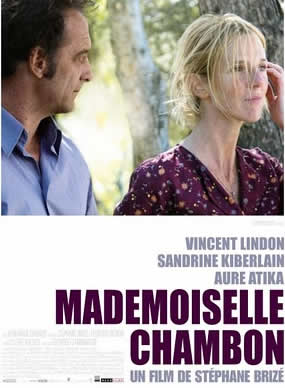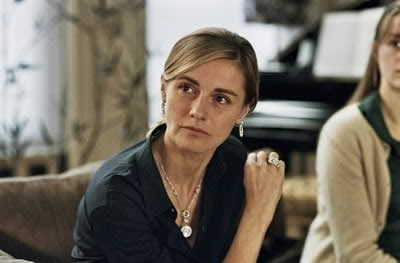 Stéphane Brizé’s subtle “Mademoiselle Chambon” details the hesitant romance of an “old maid” teacher and a strapping construction builder. Brizé worked with Eric Holder adapting Holder’s 1997 eponymous novel.
Stéphane Brizé’s subtle “Mademoiselle Chambon” details the hesitant romance of an “old maid” teacher and a strapping construction builder. Brizé worked with Eric Holder adapting Holder’s 1997 eponymous novel.
Set in a a town in the French provinces, the realistic film treats it’s fragile romance without excess sentiment. Brizé captures the “what if” quality of these adult lovers through the smallest of eye movements and passionate glances.
Brizé builds up his story with a documentary like control, Mademoiselle Chambon fills her spinster hours dutifully grades paper or reading. Jean does his masonry thoroughly ( “to last”) and cares for his aging father with the same care. Brizé portrays jean’s wife Anne-Marie at the factory or the wearing duties of running a family.
In a delightful scene, Brizé introduces the working-class couple of Jean (Vincent Lindon) and wife Anne-Marie (Aure Atika) as they struggle to help young son Jérémy (Arthur Le Houerou) with his grammer homework. When Anne-Marie hurts her back at the printing factory where she works, Jean picks up Jérémy at school. Mademoiselle Véronique (Sandrine Kiberlain) asks the shy Jean to fill in for another father, sharing his work experiences with her class. On the day, tactiturn Jean blooms under her attentive glances and the kid’s active interest in his work experiences.
Véronique asks Jean if he can find her someone to fix her rattling French windows. He offers to do the job. She dozes as he works. Rather than wake her, he tenderly lets her nap. Waiting in the gathering dusk, Jean studies the snapshots of her cultured middle class life.
Noticing her concert portraits (she was a violinist), Jean persuades her to play a tune he heard on TV. Charmed by the gruff, shy man, Véronique plays one of her favorite pieces, although she hasn’t played for people in a  long time.
long time.
Watching him lost in the music, she begins to fall in love. Both come alive through this wordless exchange. Eagerly she lends the uncultured Jean CD’s of the piece he admired. Soon they are meeting to exchange CD’s.
Running into each other in town, wary Jean guards himself from acting on his attraction. All he can do is borrow CD’s he doesn’t listen to. Mademoiselle is a peripatetic teacher transferring from school to school at the behest of the school system. Jean prides himself on building things to last, including his family. Yet Véronique’s delicate feelings get deep under his skin.
Two wordless scenes deepen their relationship. Playing her favorite piece of chamber music for Jean, the two trade covert glances, as hesitant as pre-teens then hold hands, and finally hold each other. This passionate scene leaves more of an impression than their one love making episode. Lindon (“Vendredi soir“) and Kiberlain ( “La Vie d’artiste“) were married and their easy chemistry is a marvel of delicacy and deep feeling.
The school year is ending. Véronique accepts an offer to replace a local teacher resolving to stay near him and put down roots. When Jean explains his wife is pregnant (a bombshell dropped by Anne -Marie) proud Véronique decides to leave town, packing up as soon as possible.
Before she leaves, Jean invites Véronique to play violin for his aged father’s birthday. Normally stolid, conservative Jean wouldn’t risk such a move, but his feelings are carrying him away- he sees a road not taken and longs to walk it.
Prim Véronique plays her violin, her soul visible to anyone watching her face, Eye’s closed, she sours. Staring at Jean’s rapt face, Anne- Marie reads the situation, but says nothing. The delicacy of this scene is exquisite.The pair plan to leave together but rooted Jean’s family ties prove too strong. It’s a realistic ending to a delicate romance.

